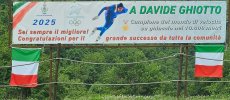European Speed Skarting Conference 2025
Hur bygger vi en hållbar, attraktiv och inkluderande skridskoverksamhet i Europa? Det var kärnfrågan när elva nationer samlades i Prag den 25–27 april tillsammans med ISU för European Speed Skating Conference 2025 – en helg fylld av idéutbyte, gemensamt ansvarstagande och visioner för sportens...
www.swesports.org
European Speed Skating Conference 2025 – focus on the future of speed skating
How do we build a sustainable, attractive and inclusive skating activity in Europe? That was the core question when eleven nations gathered in Prague on April 25–27 together with the ISU for the European Speed Skating Conference 2025 – a weekend filled with the exchange of ideas, shared responsibility and visions for the future of the sport.
The sport of skating faces many challenges – but also opportunities. To face the future, we must both understand the history of the sport and dare to adapt to a changing environment. During the weekend, everything from the development of competition programs to how we best create long-term growth from the ground was discussed.
How should the World Cup be shaped going forward? Should juniors and neo-seniors continue as they are now, or should the neo-senior cup be changed to become more attractive to more people? Is a European Cup needed? Is the senior World Cup in its current form an attractive and functioning competition? What does the competition offering look like for the second best? There were many questions – and so was the response. The participating countries provided valuable input to the ISU Technical Committee, Development Commission and Vice President Tron Espeli, all of whom were present. Rule changes and adjustments to ISU competition communications were also presented in brief.
The development of skating at a broad level was another important item on the agenda. Several participants highlighted the importance of creating a sustainable basic activity for children and young people – with a focus on skill development, adapted competition formats and safe environments for long-term engagement. There was broad agreement on the need for innovative thinking, and alternative competition formats that have been tested in Sweden and other countries were raised as positive examples.
Sustainability linked to travel for younger active people was also widely discussed. Fast skaters are welcome – but at an early age the focus needs to be on learning, joy and community rather than top times. An inspiring initiative came from the Netherlands, which presented a new handicap system where active people can compete in different arenas during the same weekend – without travelling – but still compare results. The pilot project has received positive reactions both in their home country and during the conference.
Another common theme was the importance of competent and committed officials. Several nations emphasized how crucial the role of officials is in ensuring quality, safety and community at events. When officials understand and convey rules in a clear way, respect between all involved is strengthened, which contributes to an attractive and well-functioning competition environment.
With representation from both small and large nations – as well as potential newcomers such as Iceland – the weekend in Prague became a valuable opportunity for joint reflection, cooperation and faith in the future of European skating.
Text: Bent Erik Brenden, SweSports"

